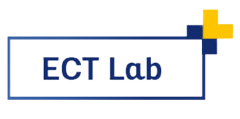
Community
ECT Lab is a community of researchers, students, and enthusiasts passionate about cutting-edge technologies.
Stay connected with us:
One of the projects aimed at broadening cooperation among all EUt+ partners is EthiCo – an Erasmus Strategic Partnership (KA203) project with the aim to develop new approaches to ethics and ecology in technology education.
Ethics is this context needs to be understood to be a form of praxis, an individual practice which has collective implications, the ethical relation to the other has now come to the fore through a worldwide pandemic of COVID-19 and its aftermath. This highlights how my inaction or action has direct impact upon the collective good. The question that Greta Thunberg poses is ‘how dare you not react?’. The ecological questions and the ethical question become one and the same.
The project, therefore, is developing an ethical framework from the work of contemporary philosophy, including the work of Deleuze and Guattari on The Three Ecologies and Paul Ricoeur in relation to his work on ‘little ethics’, and Bernard Stiegler on the development new forms of knowledge. The first phase of the project has seen the development of the theoretical philosophical ethical framework as distinct from traditional fields of applied ethics. This new framework is based upon a virtue ethics framework and narrative theories of techne and technology.
Ethics traditionally understood as applied ethics is not equipped to deal with the questions posed by the relation between technological development and ecology. The application of pre-existing ethical frameworks has not led to the desired results and has been reduced to the introduction of ethics onto the engineering degree programmes. This is partly to the cultural contexts of technological innovation and on the other hand to the sheer speed of technological change. The EthiCo project is developing specific methodologies of the ethics and ecology within the education not just of engineers but all students within higher education.
The project also develops a value system and framework through philosophical research and secondly, it is developing a teacher training module for the teaching and integration of ethics into the curriculum (including engineering, natural sciences, business, arts and humanities). This teacher trainer module will be the subject of specific Intensive Study Programme (ISP) in the Technical University of Cluj-Napoca, 7-9 March, 2023. Thirdly, the project is developing a standalone student module on ethics and ecology for level 8 programmes. Fourthly, the project will host an international conference on ‘Ethics and Ecology in Technological Education’.

ECT Lab is a community of researchers, students, and enthusiasts passionate about cutting-edge technologies.
Stay connected with us:
Explore projects connected to ECT Lab
There is an urgent need for 21st century education to be able to address the complex entangled problems of climate crisis and its relation to technological development with radical new multi-faceted transdisciplinary approaches. We believe that teaching an Aesthetics of Care with Ecology in Technological Education will provide students with the transformative set of skills and competences needed to redefine sustainable technological development for the 21st century. Following the third and fourth industrial revolutions , technology mediates ever-more aspects of everyday life to an unprecedented respect. Central to these technological shifts are trans global computational networks (Bratton), data assemblages (Kitchin), organised inorganic systems (Stiegler) of unprecedented scale and scope, and regimes of algorithmic governmental (Rouvroy and Berns) that govern the ways humans interrelate with themselves (Foucault), others, the natural environment, and civil society. Accordingly, the shaping of those technologies will significantly impact how we both mediate and act upon our environment and one another. From consumer electronics to facial recognition and autonomous vehicles, technical innovations are wrought by human ingenuity and are thus inherently cultural, bounded by human ethical and aesthetic considerations (Amoore 2020, Noble 2018) .
